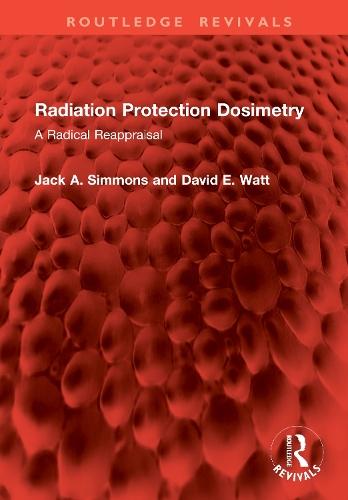Overview
Background: Physicist Jack Simmons’ research led him to develop a new paradigm to quantify radiation effects. He questioned both the International Commission on Radiation Units and Measurements (ICRU) and the International Commission on Radiological Protection (ICRP), which had established the definition and measurement of radiation dose on physical principles. Jack Simmons maintained that measurement of radiation dose should be based on the biological effects of radiation at the DNA level and his proposed model for radiation protection dosimetry was based primarily on radiation fluence rather than dose. The book: Radiation Protection Dosimetry: A Radical Reappraisal was originally published in 1999. It was the first major effort to present an alternative approach to previous radiation protection dosimetry and the new bio-effectiveness model marked a new approach which challenged traditional thinking. The book analyses the defects and limitation of the traditional radiation protection paradigm, recording the history of its evolution, primarily the roles of the ICRP and the ICRU and documents scientific lapses. A detailed description of the various radiobiological models to describe the health effects of radiation is also presented. Lasting Impact: The book made waves in radiation protection circles as at that time all radiation protection standards were based on epidemiological studies, mainly relying on data from the Nagasaki and Hiroshima bomb survivors. However, in 2020 the ICRU and the ICRP published an alternative approach to their definition of operational radiation protection quantities that went some of the way towards concurring with Jack Simmons’ views and proposals set out in the book. For this reason the decision was made to reissue this important work.
Full Product Details
Author: Jack A. Simmons ,
David E. Watt
Publisher: Taylor & Francis Ltd
Imprint: Routledge
Weight: 0.460kg
ISBN: 9781041074137
ISBN 10: 1041074131
Pages: 156
Publication Date: 01 September 2025
Audience:
Professional and scholarly
,
College/higher education
,
Professional & Vocational
,
Postgraduate, Research & Scholarly
Format: Hardback
Publisher's Status: Active
Availability: Not yet available

This item is yet to be released. You can pre-order this item and we will dispatch it to you upon its release.
Reviews
Original Reviews of Radiation Protection Dosimetry: ‘This is an important and timely book…You will enjoy this book… and will feel enriched if you spend some time considering the authors’ beliefs and proposals.’ David S. Gooden, Radiology Vol 212, No. 2 (1999).
Author Information
Jack Simmons (1934-2021) went to the newly established Atomic Energy Research Establishment at Harwell, Oxfordshire in 1952 as one of its youngest scientists. Studying part-time while working, he got into the Sir John Cass College, which became part of the City of London Polytechnic, to read physics. This led to an MSc and a PhD from St Bartholomew’s Hospital Medical College, where his interest was in the application of physics to medical problems, especially the use of radiation, and he went on to complete a two-year postdoctoral fellowship at the Johns Hopkins University in Baltimore, Maryland. There followed a spell at the Medical Research Council Radiation Unit at Hammersmith Hospital in West London, where he helped to put in place new electronic techniques and held a research position in Munich before he was asked to join the Polytechnic of Central London in 1970, where he was made a professor of radiation biophysics and took a sabbatical to work for the US Environmental Protection Agency in Washington. Jack remained at the Polytechnic of Central London, now known as the University of Westminster, for 30 years until he retired. David E. Watt obtained his PhD degree innuclear physics at the University of Glasgow. In 1956 he joined the UK Atomic Weapons Research Establishment at Aldermaston, where he remained until 1961. He was engaged in the design and development of high sensitivity detectors for absolute measurement of radionuclides resulting from nuclear fall-out. Joining a Radiobiological Research Unit in the nuclear power sector of the UK Atomic Energy Authority, Dr. Watt specialized in the study of biophysical mechansism of radiation damage. In 1969 he was part of the founding staff of the new Department of Medical Biophysics at the Unviersity of Dundee and in 1980 he was awarded the Founders Medal of the UK Society for Radiological Projection for 'contributions of distinction. In 1984 Dr. Watt transferred to the School of Physics and Astronomy at the University of St. Andrews.



